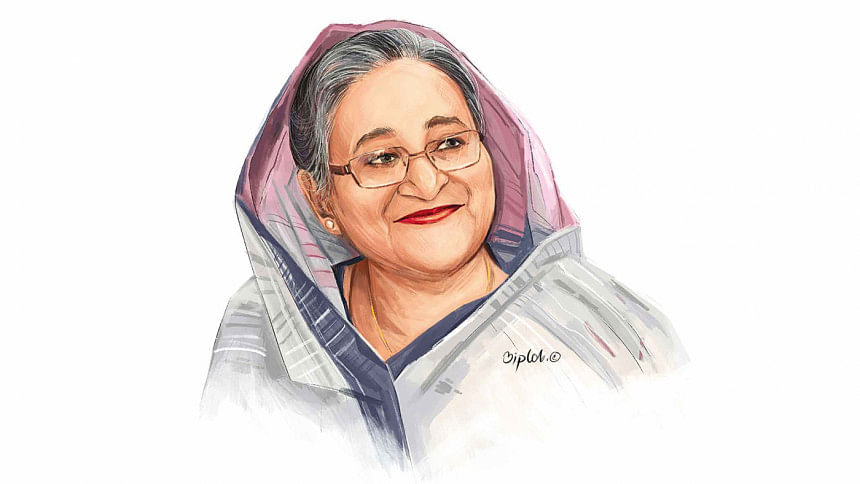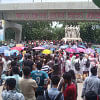Sheikh Hasina’s 76th birthday: A steely resolve that sets her apart

She is no stranger to adversity. Her life has been plagued by tragedies. But none of those could break her resolve. Instead of being weighed down with personal grief, she devoted herself to fulfilling the dream of Bangabandhu Sheikh Mujibur Rahman, her father and the architect of independent Bangladesh.
Sheikh Hasina has steered the nation through many troubled times, and today as she steps into the 76th year of her life, she faces another tricky task: helping the country ride out the economic gloom arising from the pandemic and Russia-Ukraine war.
On August 15, 1975, barely three and a half years after Bangabandhu shepherded the nation to liberation, his life came to an end when he along with most of his family members were killed. Hasina and her younger sister Sheikh Rehana survived as they were abroad when the atrocious killings took place.
The torchbearer for her father's ideals, Hasina also survived 22 attempts on her life including the grisly grenade attack on August 21, 2004, and the massacre in Chittagong's Laldighi in 1988.
Braving it all, she is still going strong in the pursuit of the "Sonar Bangla" her father dreamed of.
The eldest among five children of Sheikh Mujibur Rahman and Sheikh Fazilatunnesa Mujib, Hasina was born at Tungipara in Gopalganj on September 28, 1947, the year marking the births of two countries -- India and Pakistan.
In 1968, she married nuclear scientist Dr Wazed Miah.
In 1981, while exiled in India, she was elected the president of the Awami League, one of the oldest political parties in the country. She has been leading the party since then and has taken it to power four times.
Her political career started much earlier though. She was involved with student politics while in college and was elected the vice-president of the students' union at Government Intermediate College (now Begum Badrunnesa Government Girls' College) for the 1966-67 term.
She became the prime minister for the first time in 1996 and after that, she became prime minister in 2009, 2014 and 2019, becoming the country's longest serving premier.
Hasina placed Vision 2021 in Awami League's manifesto before the national election of 2008 with an aim to transform Bangladesh into a middle-income country.
She came up with Vision 2041 before the national election of 2014, this time aiming to eradicate poverty on way to becoming a developed nation by 2041.
During her leadership as head of the government, she took steps to initiate the war crimes trials and also the trial of the Bangabandhu murder case.
Hasina showed her courage and determination by completing the construction of Padma Bridge, which many thought a near impossible task.
Apart from the river's own mysterious character and its extremely strong currents, there were myriad challenges and obstacles -- from the uncertainty over funds to opposition from various quarters.
But nothing could deter her. A singular-minded Sheikh Hasina stood firm and made the impossible possible. The Padma Bridge, which opened on June 25 this year, will shine brightly among her many achievements.
Due to her astute leadership, she stood apart from many of her peers after Bangladesh and the world alike faced the invisible enemy – the Covid-19 pandemic -- that plunged the economy into deep contraction and created an acute health crisis.
Her government, against all odds, managed to tackle the situation.
Her role in managing and getting vaccines to eligible people was phenomenal. When many countries failed to arrange vaccines for its people, Bangladesh emerged as an example of a country with a high rate of vaccination.
As the country gradually weathered the storm, came the Russia-Ukraine war, putting the economy on the line once again as the global supply chain was badly disrupted.
And she now faces the task of steering the nation out of the economic downturn to newer heights. At the same time, she will have to prove her popularity in the next parliamentary election, slated for early 2024.
In spite of many magnificent achievements, some controversies and moves take some shine off her glorious legacy. A growing lack of public trust over the electoral system and rule of law is something that has been the biggest criticism in her ongoing 13-year tenure. The weakening of democratic institutions and enacting of various laws that shrunk the freedom of expression and media are some valid criticisms that she cannot shrug off.

 For all latest news, follow The Daily Star's Google News channel.
For all latest news, follow The Daily Star's Google News channel. 








Comments